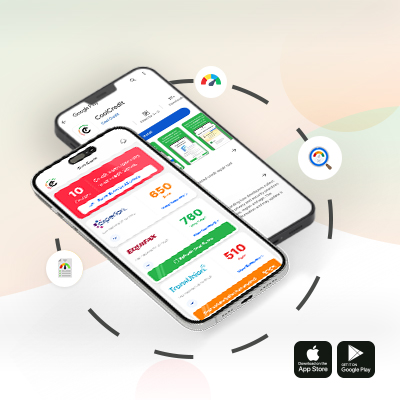
How To Build Credit At 17?
Can you apply for credit under age 18? If not, how can you build credit before 18? Well, although you need to be at least 18 to legally open credit accounts, you can still start building credit at 17. Here's how: you can become an authorized user on a parent’s credit card, manage a bank account, or explore secured credit cards with the help of a parent or guardian.
Question is: why should you even bother? And how do you get started? Read on to find out.
| Here’s a look at what we’ll cover in this blog: ▪ Why Build credit at 17? ▪ How to build credit at 17? ▪ How to build credit at 17 by becoming an authorized user? ▪ How to build credit at 17 using a joint account? ▪ How to start building credit at 17 by managing a bank account? ▪ Are there credit cards for 17 year olds? |
Why Build Credit At 17?
1. Establish a Financial Foundation Early
Building credit at 17 is crucial because it sets the stage for your future financial endeavors. Most people wonder, "Can you apply for credit under age 18?" While minors can't typically apply for credit alone, being an authorized user on a parent’s credit card or applying for a secured card through a joint account can start the journey.
▪ Short-term Implications:
Learning financial responsibility through careful use of a credit card for 17-year-olds provides hands-on experience. Managing payments can build essential financial habits.
▪ Long-term Implications:
Having a well-established credit history can help when applying for loans, renting apartments, or even job applications down the road. Starting young gives you a competitive edge when you're ready to apply for larger credit opportunities like mortgages or car loans.
Fix Your Credit with AI Precision! Let AI Repair Your Credit, Fast and Effectively
Get Started2. Better Interest Rates and Credit Options
When you start building credit at 17, you’re positioning yourself for better financial options later. How to start credit at 17 becomes a critical step toward securing favorable loan terms.
▪ Short-term Implications:
By building a positive credit history early, you may qualify for credit cards for 17-year-olds with better rewards or perks over time. This can translate to lower interest rates and better borrowing terms as you enter adulthood.
▪ Long-term Implications:
By the time you're in your 20s, a solid credit history can help you qualify for lower interest rates on large purchases, such as cars or homes. Additionally, can you build credit before 18 will no longer be a concern, as you'll already have a robust credit profile in place.
3. Qualify for Essential Services
When you ask, "Can you apply for credit under age 18?" it’s important to note that while credit cards and loans may not always be available, starting early helps you qualify for services tied to credit.
▪ Short-term Implications:
Certain utilities, cell phone contracts, and rental agreements require credit checks. If you've already begun how to build credit at 17, you'll have more options to qualify for these essential services.
▪ Long-term Implications:
Strong credit allows you to bypass the need for security deposits and higher fees. You’ll be seen as less of a risk to companies offering essential services, giving you more freedom in your financial choices.
4. Start Small and Grow Your Credit Score
Credit doesn’t build overnight. Starting young allows you to grow a good credit score gradually by understanding how to establish credit at 17 through responsible use of credit cards, even as an authorized user.
▪ Short-term Implications:
Starting small, like with a credit card for 17-year-olds, gives you a chance to learn the ropes of credit management without the pressure of high credit limits. This allows you to experiment with credit safely.
▪ Long-term Implications:
By your mid-20s, you'll likely have a strong enough credit score to secure loans with ease. You won't need to ask, "Can you build credit before 18?"—you'll already have a solid foundation.
5. Prepare for Major Life Milestones
Major life events like buying a car, renting an apartment, or even securing a mortgage are often tied to your creditworthiness. How to start building credit as a teenager ensures you're prepared for these milestones.
▪ Short-term Implications:
If you start building credit at 17, you'll be better prepared for adult life, giving you a leg up when it's time to take on responsibilities that require good credit. How to build credit at 17 might involve secured credit cards or co-signing with a parent, both of which can set you up for financial success.
▪ Long-term Implications:
When the time comes to make major life decisions, such as purchasing a home, you'll have a better chance of being approved for larger loans with lower interest rates. Starting early means fewer delays and more opportunities for financial independence.
Smart Credit Repair Starts Here! Let AI Boost Your Credit Score
Get the AppHow To Build Credit At 17?
Now that you know why it’s important to start building credit before turning 18, let’s explore different ways you can begin establishing a credit profile. Although certain restrictions apply when you're under 18, there are several effective methods to lay the foundation for good credit.
1. How To Build Credit At 17 By Becoming An Authorized User
One of the easiest ways to build credit at 17 is by becoming an authorized user on a parent’s or guardian’s credit card. This allows you to begin developing a credit history without being the primary account holder.
▪ How Does It Work:
When you’re added as an authorized user, the primary account holder’s credit card activity (like timely payments and low balances) will be reported to the credit bureaus in your name. It’s a hands-off way to start building credit without taking on full responsibility.
▪ Who Is Involved:
The primary cardholder (a parent, guardian, or another trusted adult) is responsible for the payments, while you benefit from their good financial behavior. However, if they miss payments or have high credit utilization, it can negatively affect your credit as well.
▪ Other Relevant Considerations:
Make sure the primary cardholder is responsible with their credit. Discuss expectations, such as whether or not you’ll have access to the card for purchases, and how their financial habits will impact your credit score.
2. How To Build Credit at 17 Using A Joint Account
Opening a joint credit account is another method to begin building credit at 17. Unlike being an authorized user, this option gives you partial responsibility for the account, allowing you to actively contribute to your credit history.
▪ How Does It Work:
A joint account allows both individuals (you and your co-signer) to share responsibility for managing the credit card or loan. All activity on the account will be reported under both names, which helps build your credit history through shared usage.
▪ Who Is Involved:
You’ll need a co-signer—usually a parent or legal guardian—who shares equal responsibility for the account. Both parties' credit can be affected positively or negatively depending on how the account is managed.
▪ Other Relevant Considerations:
Since you’re partially responsible, it’s important to make timely payments and avoid overextending credit. Mismanagement of the account will impact both your credit and your co-signer's.
3. How To Start Building Credit At 17 By Managing A Bank Account
Although managing a bank account doesn’t directly build credit, it’s a fundamental step in showing financial responsibility, which can later help you qualify for credit cards and loans.
▪ How Does It Work:
Opening a checking or savings account helps you learn how to manage money, make regular deposits, and keep track of your spending. Responsible banking behavior, such as avoiding overdrafts, can help build trust with financial institutions.
▪ Who Is Involved:
This method doesn’t require a co-signer but may involve a parent or guardian if you’re opening a joint account. However, you can often open a checking or savings account independently.
▪ Other Relevant Considerations:
Having a bank account with good standing over time can make it easier to transition into credit-building tools like secured credit cards or loans. Make sure to balance your account and avoid frequent overdrafts to maintain good financial habits.
Are There Credit Cards For 17 Year Olds?
While it may be tricky to get a traditional credit card as a 17-year-old, there are specific alternatives to consider, like secured credit cards or being an authorized user, both of which can help you begin building credit.
▪ How Does It Work:
You typically can’t apply for a standard credit card until you're 18, but you can explore secured cards where you deposit collateral that acts as your credit limit. This can be a great first step in learning how to manage credit responsibly.
▪ Who Is Involved:
Secured cards can sometimes be obtained with the help of a parent or guardian if you’re under 18, or you can wait until you turn 18 to apply on your own. Alternatively, becoming an authorized user on a parent’s credit card can give you access sooner.
▪ Other Relevant Considerations:
If you opt for a secured card, be sure to make consistent, on-time payments and manage your credit limit carefully. Transitioning to an unsecured card later will be easier if you have a positive track record.
Keep Your Credit In Check With CoolCredit
Even if you're still a year away from adulthood, you're never too young to check or build your credit! For those 17-year-olds who have established credit—perhaps as an authorized user—CoolCredit gives you access to your reports and lets you stay on top of your credit journey. And while most minors won't have a credit report, those who do can monitor their credit just like an adult, ensuring they catch any issues early and set themselves up for financial success!
Conclusion
Starting to build credit at 17 is a smart move for your financial future! Whether you're becoming an authorized user, managing a bank account, or exploring secured credit cards, every step counts. With the right foundation, you’ll enjoy better loan options and be ready for big milestones ahead. Plus, tools like CoolCredit let you keep an eye on your credit even before you turn 18. So, dive in now and set yourself up for success!





